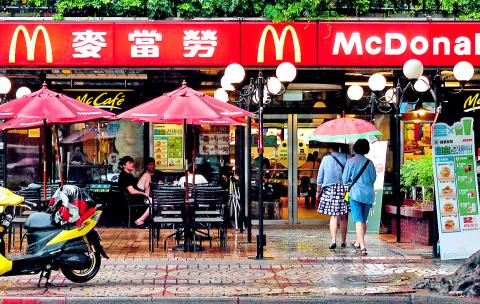McDonald’s Corp is looking to sell its 350 branches in Taiwan to potential franchisees as part of the US fast-food chain’s global turnaround plan, according to a company statement released yesterday.
That would put an end to its 31-year tradition of company-owned stores in this nation.
A lackluster performance in Taiwan led McDonald’s to consider selling a 90 percent stake in its local operation to potential franchisees, who would be required to sign a 20-year franchise contract, a reliable source said.

Photo: Chu Pei-hsiung, Taipei Times
McDonald’s said in a statement that its decision was in line with its turnaround plan unveiled last month, which includes a restructuring of its international business.
McDonald’s said it is seeking suitable local franchisees.
“Ideal candidates would have strong operational capabilities and a full understanding of the Taiwanese market,” the statement said.
“This plan is still in the preliminary stage. We do not have further information at the moment,” McDonald’s said. “No organizational restructuring will occur during the process of the [ownership] transfer. McDonald’s is not planning to exit the Taiwanese market.”
The Chinese-language Business Weekly yesterday reported that McDonald’s told local employees during an internal meeting on June 12 about the plan. The report said McDonald’s could secure a deal by the end of this year at the earliest.
McDonald’s might sell its local operation to foreign buyers, as local food conglomerate Uni-President Enterprises Corp (統一企業) might not be on its short list, the report said.
McDonald’s outlets in Taiwan employ about 16,000 people.
The Ministry of Economic Affairs’ Investment Commission said it has not received any applications from McDonald’s to withdraw its investment from Taiwan.
If McDonald’s wishes to pull out its NT$2.756 billion (US$88.75 million) investment, it would have to submit such an application, and potential franchisees would also have to submit applications for deliberation, commission official Yang Shu-ling (楊淑玲) told a media briefing in Taipei.
The Department of Commerce said it is common for US fast-food chains to adjust the proportion of company-owned or franchisee-run stores.
“McDonald’s decision does not mean it has lost faith in Taiwan’s investment environment,” department Director-General Cynthia Kiang (江文若) said.
The company’s move shows that Taiwan is a mature market, the department said in a statement.
Additional reporting by Lauly Li

MORE VISITORS: The Tourism Administration said that it is seeing positive prospects in its efforts to expand the tourism market in North America and Europe Taiwan has been ranked as the cheapest place in the world to travel to this year, based on a list recommended by NerdWallet. The San Francisco-based personal finance company said that Taiwan topped the list of 16 nations it chose for budget travelers because US tourists do not need visas and travelers can easily have a good meal for less than US$10. A bus ride in Taipei costs just under US$0.50, while subway rides start at US$0.60, the firm said, adding that public transportation in Taiwan is easy to navigate. The firm also called Taiwan a “food lover’s paradise,” citing inexpensive breakfast stalls

TRADE: A mandatory declaration of origin for manufactured goods bound for the US is to take effect on May 7 to block China from exploiting Taiwan’s trade channels All products manufactured in Taiwan and exported to the US must include a signed declaration of origin starting on May 7, the Bureau of Foreign Trade announced yesterday. US President Donald Trump on April 2 imposed a 32 percent tariff on imports from Taiwan, but one week later announced a 90-day pause on its implementation. However, a universal 10 percent tariff was immediately applied to most imports from around the world. On April 12, the Trump administration further exempted computers, smartphones and semiconductors from the new tariffs. In response, President William Lai’s (賴清德) administration has introduced a series of countermeasures to support affected

CROSS-STRAIT: The vast majority of Taiwanese support maintaining the ‘status quo,’ while concern is rising about Beijing’s influence operations More than eight out of 10 Taiwanese reject Beijing’s “one country, two systems” framework for cross-strait relations, according to a survey released by the Mainland Affairs Council (MAC) on Thursday. The MAC’s latest quarterly survey found that 84.4 percent of respondents opposed Beijing’s “one country, two systems” formula for handling cross-strait relations — a figure consistent with past polling. Over the past three years, opposition to the framework has remained high, ranging from a low of 83.6 percent in April 2023 to a peak of 89.6 percent in April last year. In the most recent poll, 82.5 percent also rejected China’s

PLUGGING HOLES: The amendments would bring the legislation in line with systems found in other countries such as Japan and the US, Legislator Chen Kuan-ting said Democratic Progressive Party (DPP) Legislator Chen Kuan-ting (陳冠廷) has proposed amending national security legislation amid a spate of espionage cases. Potential gaps in security vetting procedures for personnel with access to sensitive information prompted him to propose the amendments, which would introduce changes to Article 14 of the Classified National Security Information Protection Act (國家機密保護法), Chen said yesterday. The proposal, which aims to enhance interagency vetting procedures and reduce the risk of classified information leaks, would establish a comprehensive security clearance system in Taiwan, he said. The amendment would require character and loyalty checks for civil servants and intelligence personnel prior to